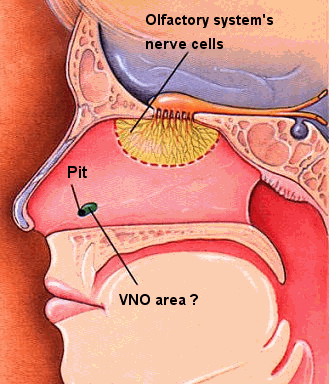
Pheromones are defined as chemicals released by an individual that act on another individual of the same species, as opposed to hormones which act on the same individual. Pheromones are odorless molecules found in many animals, including humans, that trigger primal urges connected with sex, defence and kinship.

The pheromone sensors are called Vomeronasal Organs (VNOs) and they are located inside the nose, just as are the organs that pick up olfactory signals (smells). Pheromone information from the VNO is carried straight to the hypothalamus, the older part of the human brain, and we are not aware of its presence. We cannot “smell” pheromones in the same way as we might smell roses or car exhaust fumes.
Until recently the VNOs were thought to be vestigial organs that we humans no longer use, but as you may have noticed, some perfume manufacturers are adding pheromones to their products, and trying to convince us that the use of scents with added pheromones will make us more attractive sexually. Scientists disagree about whether humans still use pheromones as a method of inter-personal communication: current research seems to indicate that we do, although the effects occur below our conscious awareness. Any effects that do exist are considerably less obvious in human beings than in other animals.
George Preti, a researcher at the Monell Chemical Senses Center in Philadelphia says that pheromones are airborne chemical signals that influence mating, dominance, family ties, and maturation. In humans, pheromones seem to convey information about identity, kinship, age, health, happiness, fertility and arousal.
"Recent scientific research has shown that men prefer T-shirts worn by ovulating women to those worn by women in another part of their cycle. A woman will unknowingly rate male body odor as more pleasant if the source of the odor shares fewer of her immune-system genes (which means he's less likely to be close kin). People exposed to cotton underarm pads worn by moviegoers can tell whether a viewer was scared or amused."
From an article about George Preti. Click here to read it
"...In addition, both males and females are affected by pheromones and the olfactory secretions of their children and their mates ... Like insects and other animals, scent promotes individual and gender recognition, can determine caste assignment and social and economic status, as well as kinship, group, and maternal identity. For example, a breast-fed human infant is able to distinguish by smell, the breast of his mother vs that of another lactating female ... Conversely, even with as little as 10 minutes of exposure to their newborn, mothers are able to identify the smell of their baby vs that of another infant ... In fact, even fathers, as well as aunts and grandmothers are able to identify, by smell, a garment worn by genetically related vs unrelated infants including garments worn by the biological mother ..."
From "Olfactory Limbic System". Click here to read it
It appears to me that this information could partly explain why some adoptions “take” better than others. If your adoptive mother’s scent and pheromones are chemically akin to your own, then maybe it is easier for you to transfer the feelings you had for your mother on to your new caregiver, and a new attachment or bonding can take place. But if you and your adoptive mother secrete pheromones that tell you both that you are complete and utter strangers, not genetically related at all, this might make it extremely difficult, if not impossible, for you to form a new and secure attachment.
In the latter case, the baby, who has already experienced bonding with its natural mother, would be very well aware of the difference. The adoptive mother, unless she has already had a bonding experience with a baby of her own, very likely would not. Or not consciously.
Perhaps human beings picking a new baby for adoption, should insist on holding and sniffing the potential adoptee, rather than allowing themselves to be seduced by an appealing smile or a touching description.

There is an article about the function of pheromones in the bonding of baby mammals and their mothers here:
It includes the following statement
"...all female mammals produce during the first days after the birth of the offspring, a pheromone that induces a good emotional status for the baby. It is a very complex mechanism...[but] obviously, this is part of the root of attachment."